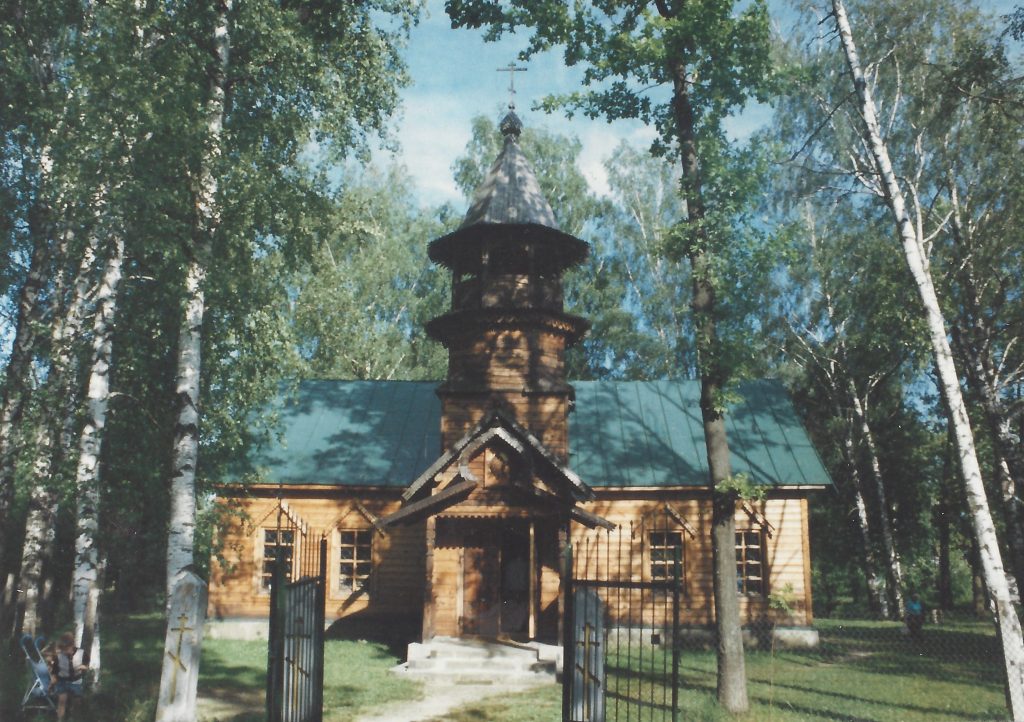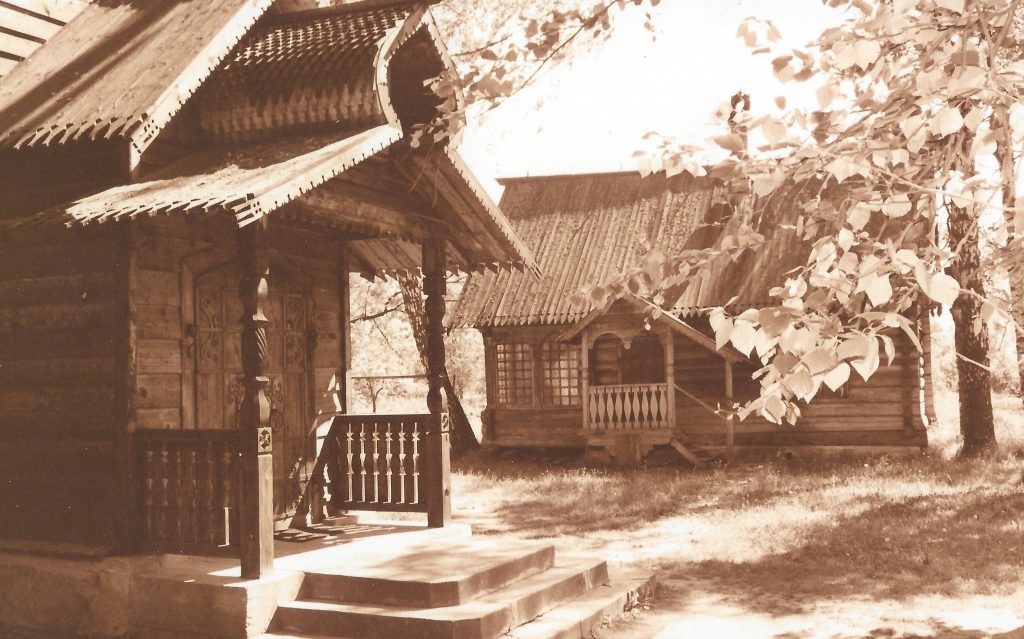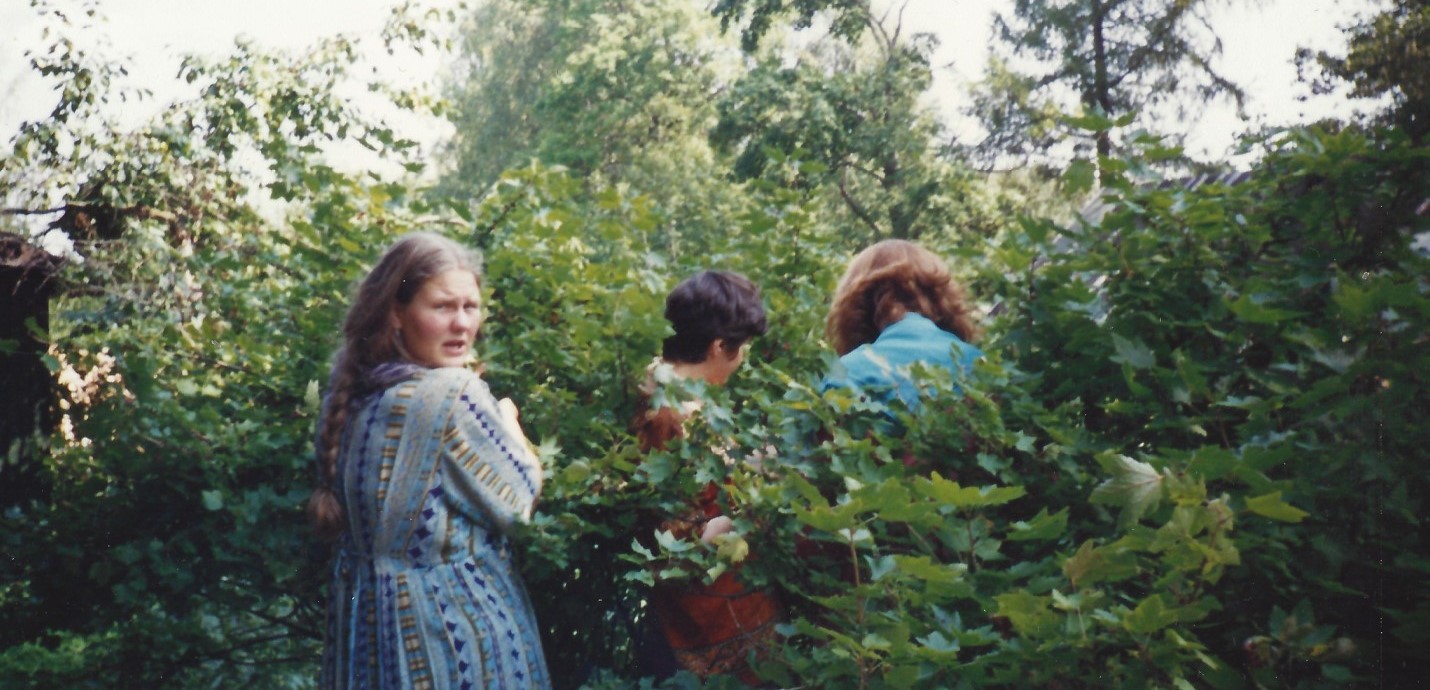Kārsava is a little town right by the Russian border, where I, a Rigan who didn’t understand shit in Latgalian, lived for a little under two years in the ‘90s. Over time and with difficulty I did pick up a little Latgalian, because the old women at the hospital, lying there at death’s door, wouldn’t speak otherwise. They were often alone and left without loved ones, and I went to take biscuits to them and chat a little bit. When one of these abandoned souls died, her relatives had to be brought to the morgue. There she lay like a newborn, old child, covered up with newspapers. That was what poverty was like.
One other old lady was dying, slowly and painfully, and the Orthodox father suggested I go and find the “ksjondza”1, as he called the Catholic priest. I went to the church and stood in line for confession, because I didn’t know how I could get the priest out of the little box in order to talk to him. When my turn came, I started to tell the priest through the carved wood that there was one old dear at the hospital, she wouldn’t give up the ghost, she was in torment, she needed extreme unction. “Wait a moment, those aren’t sins at all!”, he said, getting out of the confessional and presenting me with a little picture of a saint as an “apostolate”. What an apostolate was, I didn’t know.
At Kārsava hospital, they told me about a doctor who was sent there from Dundaga2 after the war; the locals laughed that they couldn’t understand a thing – probably she spoke in a pretty German way. In Kārsava, Rigans were “incomers”, and people round there didn’t understand why I, a “katoļička”3, sang at the Orthodox church, because there it was all simple: Latvians automatically counted as Catholics, Russians were Orthodox. I sang at the St. Efrosīnija Orthodox Church and helped out at the frequent funerals, rare weddings and a pretty decent number of baptisms. I already had a lot of experience with weddings. When I was still studying at Teika School in Riga, we did work experience at the register office; there I worked as a folk maiden, in Latgalian traditional costume because at that time blonde plaits were an important head decoration. I had to open and close the doors and bring in the gold ring, and sometimes I would have to speak fiercely to emotional brides: “bride, please, stop laughing! Everyone is depending on you.” That would do the job, and I would quickly open the door before the bride was overcome by the next wave of nervous laughter. Bridegrooms pretty rarely laughed or cried, some were mildly pissed, for some of them it was their fifth, or even in one case their ninth wife. The muses of the register office had prepared poetry for all circumstances: from “and the sharp knife does not cut bread”4 to “once again I go across the bridge of hopes…” or, for older couples, about silver hair and apple blossom. The kokle player would play: “come, love, come, come, into our souls”.
When I myself got married in Teika, I really begged for there not to be any songs or verses, but they recited some poetry to us just the same – at least they left out the kokle.
It was different with funerals. I most dreaded the burials of drowned people, because in the summer it was hot and they didn’t smell good. Since then a large quantity of flowers, even at a florist, has generally reminded me only of funerals, not of happy occasions. It always seems that between the loads of flowers looms the lace of coffins.
Funerals generally were a rather jumpy business – once, our batjuška5 Anatolijs Nikolajevičs was late for a funeral, because his Lada, a rattling old banger, broke down on the way. Father Arkādijs, who had a day off, drifted over from Goliševa to replace him. He had been spending his free time in the company of a bottle or two. I propped him against one of the church’s wooden pillars, so he could at least start burning some incense while I sung some psalms – at least until one of us would get a proper slap, because it wasn’t a funeral but a pitiful amateur performance. Luckily, an hour later the batjuška arrived and saved us from dishonour.

People from all over the world travelled to the church to see father Viktors. A visa regime had been introduced with Russia, but everyone still remembered how for festivals a pan of fish croquettes was sent from Leningrad (because the monks didn’t eat meat), and it was picked up at Bozova station still a little warm from the train conductor’s soft hands. In a house by the church lived Serafima Fjodorova (born 1912), a strong woman who had lived through the siege of Leningrad. Other “siegees” would come to visit her, one called Maša Boicova who spoke about how she had carried a bowl of gruel to her mother who was dying of hunger, and cried because she could not eat it on the way. She said that in it there was a little dab of butter – although now that strikes me as not particularly believable. In the three-storey brick building with a wood-burning stove also lived Alla Ivanovna, a French teacher from Donetsk, who spent part of the time I was living there studying with the Catholics in Jerusalem. It was not only theologians and other wiseacres, and those in search of spirituality or confession who visited, but also people with mental illnesses, drug addicts and alcoholics, because many craved God’s help and conversations with father Viktors, and it was rare for him to turn someone down. For some time I lived in one of the church houses with two unwell girls. One would rush around the church, extinguishing the oil lamps and growling, or set off alone by foot for Rēzekne or Ludza; the second girl, from Moscow, ate nothing at all, exorcised demons and was delighted by how much she had dried up – she had neither periods nor lust. One night an inebriated pilgrim broke into the house because he wanted to talk. But all that was nothing: another time a priest started running around with an axe and threatening everyone – he had psychosis. I was 19 and didn’t understand anything about any of that. Sometimes the assembled pilgrims talked late into the night, about spirituality, about Berdyaev and Florensky, about the Church Fathers, about spiritual friendship and that light that was in the world before its creation. It didn’t occur to any of them to bring water from the well for soup and washing the floor, but some would at least chop firewood if asked.
That was the Latgale countryside version of the poverty of the ‘90s – when towards spring carrots for soup ran out, but there was sauerkraut, and potatoes overgrown with sprouts. When the shop got a delivery of cheap blood oranges (most likely some kind of humanitarian aid), which could be neatly sliced and placed on a dessert plate for afters. Ever since then I’ve been able to make soup from absolutely nothing. We sang in the choir together with retired accountant Valentīna and the aristocratic Marija Jakovļevna, who was wrinkled as a tangle of old roots but was always in a beautiful shawl and sung “diskonkts”6 (soprano). Sometimes the choir was joined by the fierce Klavdija Ivanovna, who claimed that the batjuška had thrown out all the pretty icons where George was on a white horse – in the picture painted by Father Zenons the horse was devilishly black. Rosy-cheeked cherubs, true to life in size and beauty, were the form of easel-painting that old Klavdija was fondest of.

When the batjuška went off on holiday, we had to spend the night in the church so that it wasn’t robbed along with all the horse icons. The first night I was really afraid, because I had seen the film Viy and knew the kinds of Gogolian horrors and tears of blood that could go on at night in a church. Just before falling asleep one lady said to me that she liked that place in the Bible where Jesus said that the Orthodox would be at God’s right hand, but that the Catholics would go to the left. “My own husband is a Catholic, but that doesn’t matter”. Then I still didn’t know how to argue with adults, or I would have explained that Jesus couldn’t have said that, because he died before either Orthodoxy or Catholicism was established. And that anyway he was talking about livestock. (Matthew 25:31–33).
Nearby lived Father Leonīds, who had few teeth, a smile that reached his ears, and a bayan in his hands. My Orthodox name was Vera, the same as his mother, and he mentioned this several times a day. In the evenings after a few snifters, he would come under my window to sing doleful songs. Sometimes he would play seventh-mode chants and would pretend that it was a singing lesson, because they were darned complicated melodies in which I would get muddled up. Sometimes he brought me carrots, which we would plant in his field, because it was hard for him to do it alone. For a townie like me, field work was baffling; I dragged the plough along crooked furrows. Sometimes schoolchildren came to help – they liked pulling the plough themselves, and then it was I who steered them along the crooked furrows. One little boy said that he was very afraid of going to the shed for firewood during the night. He lived together with his granny, and she didn’t go anywhere at night; the boy’s father was in prison. I said that on the back of the little cross he had there was written “save and protect”, and that meant that he was invincible and nothing bad could happen to him. That was most likely a burning hope on my part, not a conviction, but the boy said that he would hold onto the cross in the darkness. In general the children thought that everything in and around the church, including its guardhouse, was holy. When in the courtyard there appeared a white and stupid cat, which, rather than catching the mice, simply observed them with the pedantic diligence of a biologist, the boys asked “А котик у вас тоже божественный?” (“Is your kitty holy too?”). Holy that cat was not, just dirty-white. And it was thanks to that white ball of fluff that I would be suddenly awakened by the patter of rat paws in an Olympic sprint over my face. When the terrible rat had disappeared, the cat, little pale-face, would come up to me to hide from it.
I would like to say that the countryside made me into a dextrous Earth mother, but that would be a lie. I planted cabbages in the furrows, where they were eaten up by corpulent caterpillars, and thinned out the carrots, which everyone liked, and the spring onions, which there were always too few of for the big church family. Some cabbages behaved so awkwardly that in anger I almost ripped them out of the ground. In the autumn I discovered that they were kohlrabi, which really did have only a couple of leaves. Simpler was collecting mushrooms in buckets and salting them for the winter in three-litre jars, where they lay like brown dead man’s fingers until the start of Lent. I ended up making apple or lingonberry jam only rarely, because sugar was expensive or I just didn’t have money, or sometimes both at once. The apples had to be peeled and dried over the stove, where there were already strings of mushrooms hanging. It sounds as if I was living not in Kārsava but in a Soviet animated film where a hedgehog comes out from a strange forest with an apple and a mushroom on its prickles, because the hedgehog has that kind of forest.
When there was black ice in the little town, I would take bread to the ladies from the church choir. I had black Norwegian charity shop boots with studs. Once I was shuffling along the ice-covered Sporta iela and a man with a horse-drawn sleigh drove up to me. That is the only time I’ve been for bread on a low sleigh, wrapped in furs. I realise just now that this story about the sleigh in the winter could have happened in the 19th century as well as the 20th, and for some perhaps it still happens even now.

1. Derived from the Polish word “ksiądz”, meaning a priest. Latgale has a significant Polish and mostly Catholic minority, and the Polish language has historically been important in the region.
2. Dundaga is a small town in Kurzeme, in western Latvia, where there has historically been much more German influence on society and language than in Latgale.
3. The diminutive form of “Catholic” in Latgalian.
4. A line from the canonical Latvian 20th-century poet Imants Ziedonis’s “Do Not Live Without Love” (“Bez mīlestības nedzīvojiet”).
5. Russian – (батюшка) – “father” (term of address for an Orthodox priest).
6. An old-fashioned term for a soprano.
All images – credit Satori/Lolita Tomsone
This article originally appeared on Satori. Translated from Latvian by Will Mawhood.
Lolita Tomsone is the director of the Žanis Lipke Memorial. She lived for many years in Jerusalem and has written for the magazine Rīgas Laiks. In her native Riga, she longs for Jerusalem.
Like what Deep Baltic does? Please consider making a monthly donation – help support our writers and in-depth coverage of Estonia, Latvia and Lithuania. Find out more at our Patreon page.

